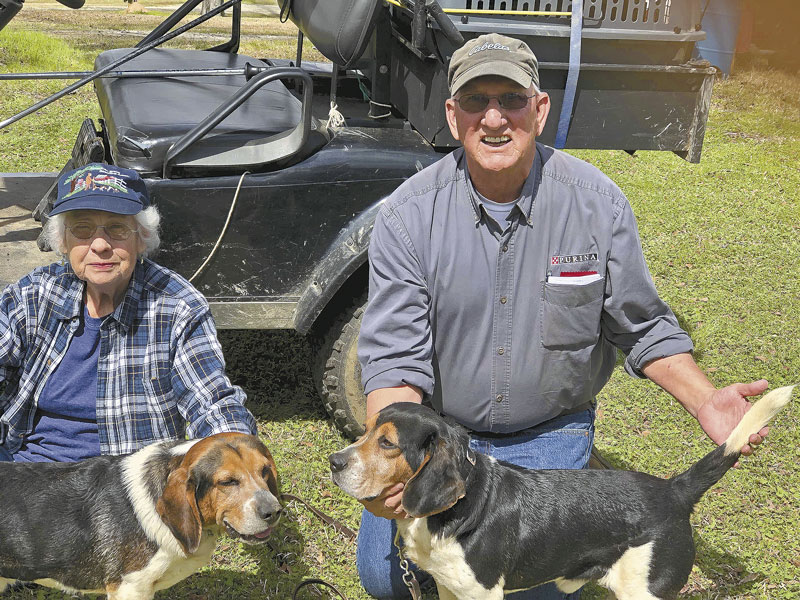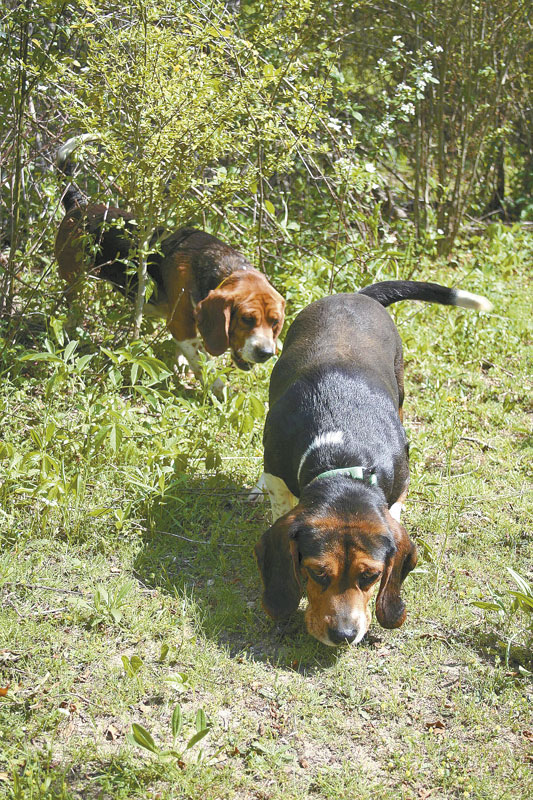
Benjie’s shining moment
Cotton Hill Benjie was not a great dog, but he was a solid, little, 13-inch beagle who held his own in field trials, and some days, he really excelled. One of the days he shined was March 11, 2020.
In beagle field trials, the hounds vie for points and first-place finishes. A dog must accumulate 120 points and have a minimum of three wins to be recognized as a field champion by the American Kennel Club.
First place earns a point for each entry in a class. Second place gets half as many points, third place a third as many points and fourth place gets one-fourth of the points. Benjie entered the competition at Savannah River Valley Beagle Club in Edgefield, S.C., that day with two wins and slightly more than 90 points.
Most beagle clubs are laid out with patches of fairly heavy cover — weeds, brush, grasses, broomstraw, briars and piles of cut limbs and small trees — that provides havens for rabbits. The “gallery” — the group of handlers, observers and judges — moves through this cover, beating the brush with “tallyho sticks” to drive the rabbits out. A tallyho stick can be anything from a trimmed 3-foot length of a sapling to a ski pole or even a broom handle.

Rabbit tracking
Once the rabbit has moved out of his hiding place, the dogs are brought to the line and released. The dogs in traditional trials are run in braces. Their job is to trail the rabbit with as little variance from the scent line as possible, until the judges have decided on a winner of the brace.
The dogs do not “chase” the rabbit in traditional trials. Nor are they expected to catch it. Healthy rabbits are a precious commodity for a beagle club. A healthy bunny population has to be maintained year-round in order to have rabbits for the next trial.
Once all the dogs have competed, the judges pick the best ones to run in Second Series, with the highest-scored dog back “high” or first in the first brace of Second Series, and so on, depending on how they were scored.
Benjie had an excellent run in First Series that day and came back high in Second Series. And he put on a show.
The gallery jumped a rabbit in one cover patch, and it crossed over a grassy lane into another stand of thick cover. Benjie and his bracemate trailed the rabbit through the thick mass of grass, briars and low bushes.
Unyielding
Benjie was relentless, never yielding the front and never faltering in his pursuit. The rabbit exited the first cover patch and crossed over into a second cover stand. Benjie forged on, claiming every foot of the scent trail with his characteristic baying bark. In field-trial lingo, he was “counting rabbit tracks.”
The rabbit left the second patch of cover and turned down the grassy lane for a few steps before ducking into a third cover stand. Locked on to the trail, Benjie followed the rabbit’s trail with precision, with his bracemate right on his heels. Once he turned into the next cover patch, the judges had seen enough. And Benjie had his coveted third win, plus about a dozen more points, putting him within a few more trials of reaching that magic total of 120 points.
Unfortunately, as in all aspects of life, the highs always seem to be balanced by the lows. Walking past Benjie’s kennel later that day, I noticed his head was drooping, and his eyes indicated he was experiencing some serious discomfort. A visit to the vet determined that Benjie had a kidney stone, and surgery was scheduled the next morning.
No more pain
The operation revealed that the kidney stone was the least of Benjie’s problems. A cancerous mass encompassed his abdominal cavity. Benjie might have lived another month or two, but he would have experienced increasing pain as the cancer spread, so the humane decision was made to spare him an unwinnable fight.
He came so very close to that title of champion. He did not get the title, but in his best performance since coming to my kennel, he finished his last field trial like a true champion.
Will Rogers, the great humorist and social commentator, was quoted as saying: “If there are no dogs in heaven, then I want to go where they went.”
If dogs do go to heaven, I expect Benjie is there counting rabbit tracks to his heart’s content.



Be the first to comment